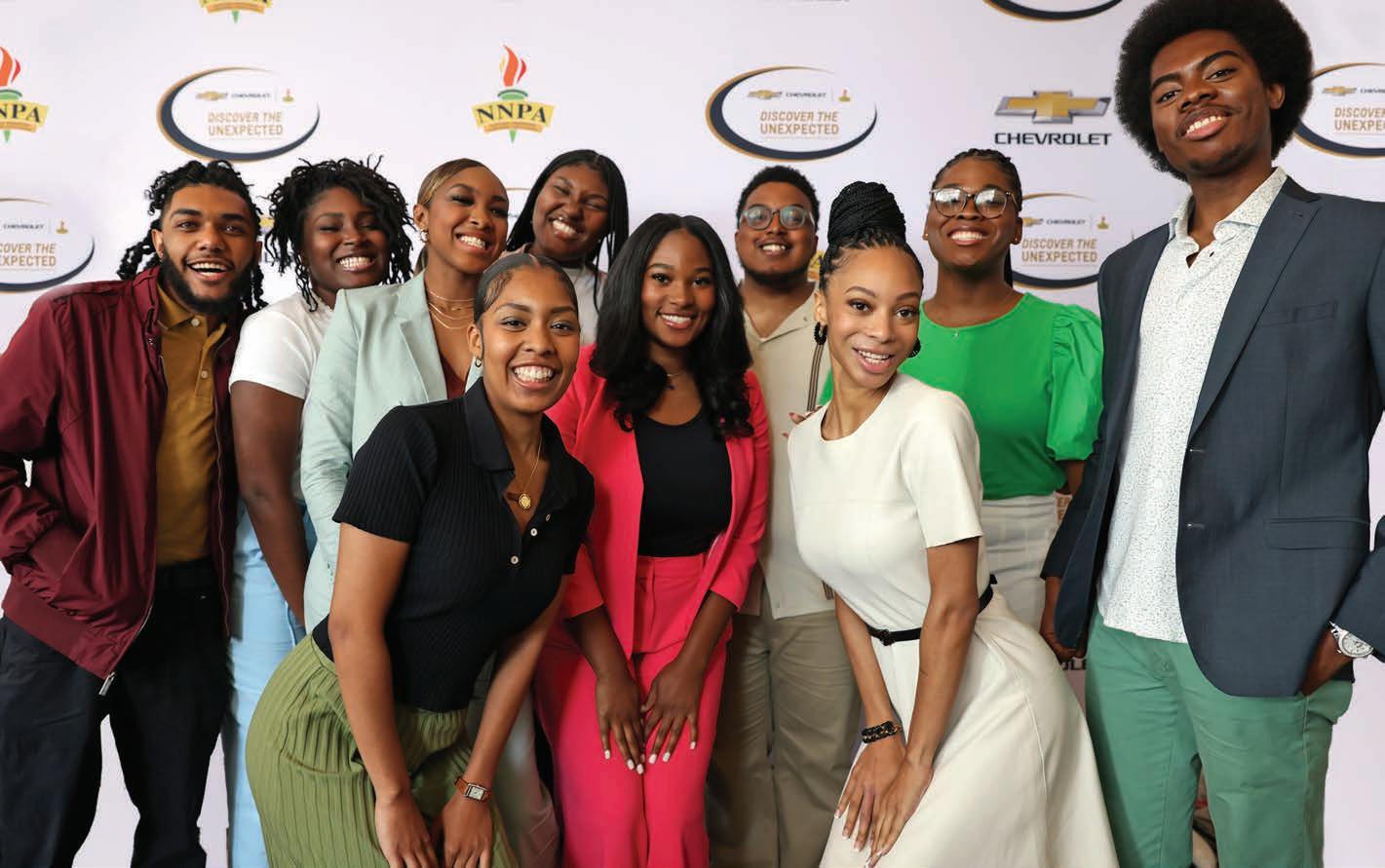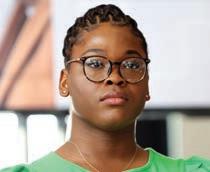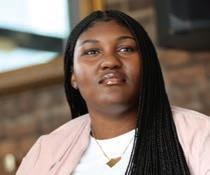




Within the next few years the city of Atlanta will play host to events and people from all over the country and the world. From the World Cup in 2026 to the college football penultimate game in January 2024. This week it was the United States Conference of Mayors, a Washington, D.C.-based organization, consisting of mayors from cities of 30,000 people or larger.
Women and men dressed in pants suits, blouses and skirts and suits filed into the Wisteria Room on the second floor of the Waldorf Astoria Atlanta Buckhead just before noon Monday, Oct. 3. Mayors of cities, both big and small, were in Atlanta for the first time. Atlanta’s mayor eventually joined them at the front of the room and made his way to a podium.
“I’m glad to host these mayors and industry leaders,” Atlanta Mayor Andre Dickens said. “We talked about how good mayors share and borrow good ideas, and how great mayors steal good ideas,” he joked.
In much friendlier surroundings with the focus on a much friendlier subject than the recent “Cop City press conferences that have taken place in and around Atlanta City Hall, Dickens was there to help kick off the organization’s inaugural Public-Private Partnership Council meeting. Alongside him representing the state of Georgia was Brookhaven Mayor John Ernst, Chamblee
Mayor Brian Mock, Sandy Springs Mayor Rusty Paul and Union City Mayor Vince Williams. Of the 1,400 mayors in the organization, 12 other mayors attended the twoday conference including, Columbus (OH)
Mayor Andrew Ginther, Newport News (VA)
Mayor Phillip Jones, Newport (RI) Mayor Xay Khamsyvoravong, Riverside (CA) Mayor Patricia Lock Dawson, Jackson (MS) Mayor Chokwe Lumumba, Montgomery (AL) Mayor Steven Reed, Columbia (SC) Mayor Daniel Rickenmann, Rialto (CA) Mayor Deborah Robertson, Arlington (TX) Mayor Jim Ross, Lansing (MI) Mayor Andy Schor, Providence (RI) Mayor Brett P. Smiley, Birmingham (AL)
Mayor Randall Woodfin, and Tempe (AZ) Mayor Corey Woods.
Asked how it feels to have so many mayors from as far away as Arizona, California and Texas, for example, in Atlanta, Dickens said, “It feels good. These are my friends, colleagues and co-laborers across the United States. Atlanta is a hospitality city and we’re open to making sure we show people a great
time.”
The Public-Private Partnership (P3) Council took place in Buckhead, an area of the city that was anything but bipartisan less than a year ago. Dickens helped bridge that gap between the city and its ritziest zip code and now as chair of the P3 task force he was back to continue making partnerships. A major part of Dickens’ initial campaign and his mayorship has been his need for public-private partnerships for the betterment of the city. Mayors and business leaders from all over the country will hold closed sessions over the next two days on how to best continue building those bridges.
There will also be dinners and receptions before concluding the meetings Wednesday afternoon.
“This won’t just be in Atlanta, this is the first, maybe six months from, maybe 12 months from now we will be in one of these other cities where we’ll all get a chance to experience the wonderful things they are doing in their cities,” Dickens said.
Birmingham Mayor Randall Woodfin is also in town for the council meetings. With just under 200,000 residents, Birmingham, which recently hosted the national Association of Black Journalists convention in August, is one of the southern cities looking to

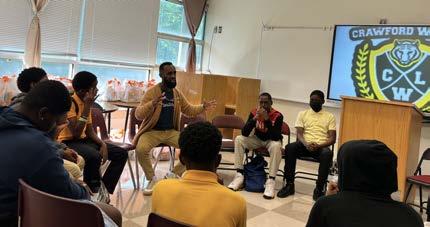
learn more about building partnerships with local businesses,” said Woodfin.
“The best ways for cities to generate more funding is through public and private partnerships,” he said. “Having the private sector at the table is always good for cities.”
“We are really focussing on solutions that matter to every American that is living, working and playing in a city,” said Sidewalk Infrastructure Partners policy and strategic partnership rep David Gilford. “I am optimistic about hearing the new ideas to solve challenges that range from housing afford-

Clark Atlanta University head football coach Willie Slater was relieved of his duties as the leader of the program Monday, Oct. 2, 2023, according to a release from the university.
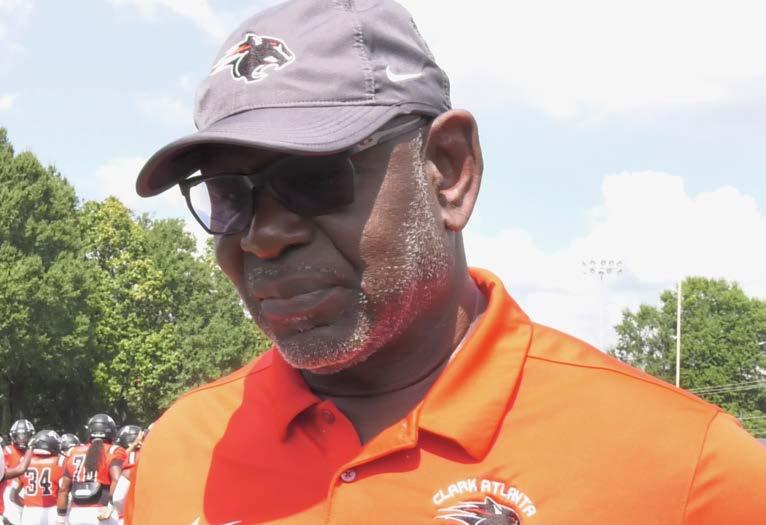
On Tuesday, Oct. 4 Athletic Director Dr. Jerel Drew named Richard Moncrief, the team’s offensive coordinator for the past 6 seasons, the interim head football coach.
CAU also announced a national search for the program’s next head football coach.
"We appreciate coach Slater for his dedication and contributions to CAU's football program," said the release. "There is no doubt that coach Slater has had a tremendous impact on our institution, and we are grateful to him for his support and hard work during his tenure."
The Panthers are heading into the sixth week of the season without a victory, recently losing at home 34-24 to Lane College Saturday afternoon. There are five games remaining on the schedule including the annual rivalry matchup with Morehouse Col-
Continued from page 2
ability to dealing with the constraints of legacy infrastructure.”
Gilford, a New York City resident, mentioned the recent flooding that took place throughout the city last week. That was just a few weeks after the Atlanta University Center experienced flooding that damaged dozens of cars and private property.
Robertson, the mayor of Rialto, California
lege, Saturday, November 4.
Slater was in the middle of his second season with the program. Prior to taking over at CAU, he won seven SIAC championships as a head coach at Tuskegee University. Slater took over for former head coach Tim Bowens following a 2-8 season in 2022.
At his February 11 introduction ceremony Slater thanked the CAU administration for the opportunity.
“I’m excited about being here and being the leader of this program. The administration is dedicated to making the program good and I think that once the young men get there, they are going to understand that and see that," he said.
Slater, a native of Coffeeville, Alabama, began his coaching career in Georgia before coaching at multiple high schools in Alabama. As a college coach he coached offenses at Troy State, North Alabama Jacksonville State and Temple University before taking over the program at Tuskegee in 2006. Slater amassed an overall record of 123-47 during his time at Tuskegee and was named SIAC Coach of the Year five times.
(population 104,394), made sure to tell Dickens how big Hartsfield-Jackson International Airport is. The mayor told the story just before the press conference ended.
“That was a lot of steps,” said Robertson with a smile.
The organization holds two meetings per year, with one in the summer and the other in January, according to its website. Future meetings are scheduled for Minneapolis, Boston and D.C. this month and Tampa, Los Angeles in November.
Michael Jordan is arguably one of the best professional basketball players in the history of the NBA. Among his many accomplishments during his illustrious career, Jordan was Rookie of the Year, five-time NBA MVP, six-time NBA champion, six-time NBA Finals MVP, and NBA Hall of Fame inductee. Jordan’s final game as a player was on April 16, 2003, where he finished with 15 points in a loss to the Philadelphia 76ers.
“Now I guess it hits me that I’m not going to be in a uniform anymore—and that’s not a terrible feeling,” Jordan said afterward. “It’s something that I’ve come to grips with, and it’s time. This is the final retirement.”
Jordan was a phenomenal athlete with a thrilling combination of grace, speed, power, artistry, and competitive desire. Yet Father Time was the only opponent the then-40-yearold Jordan could never overcome. There are current players, like Jordan, who are competitive past their basketball prime, but physical skills will eventually decline, and all players will suffer the same fate: retirement. While a 40-year-old Jordan is considered old by professional sports standards, he would be regarded as relatively young as an elected politician.
But Father Time respects no one, and he ultimately catches up with all of us. Just as Jordan concluded it was time to “hang it up,” Utah Sen. Mitt Romney made the same decision as he recently announced that he will not seek a second term. Romney emphasized the need for a new generation of leadership. “At the end of another term, I’d be in my mid-80s,” Romney, 76, said in an interview. “Frankly, it’s time for a new generation of leaders. They’re the ones that need to make the decisions that will shape the world they will be living in.”
A true leader understands they cannot be held captive by their pride, ego, fame, and thirst for power when an influential and productive career has run its natural course, and it becomes time to pass the baton to the next generation. In a rare move, former Justice Stephen Breyer retired from the Supreme Court, allowing President Biden to appoint a successor who could serve for decades.
There was not a major ideological shift when the 51-year-old Ketanji Brown Jackson replaced the 83-year-old Breyer, but rather a critical generational and cultural shift that gives a fresh voice speaking on behalf of a diverse nation. It is the generational and cultural shift that causes Republicans to feel threatened. Young people can be a formidable voting bloc in elections if they mobilize across racial and party lines.
Unsurprisingly, young conservatives feel abandoned by the Republican Party when evidence shows they are targets of the same voter suppression tactics used against minority voters.
In Texas, Republicans introduced a bill that would ban all college voting centers and drop boxes. In Florida, the governor approved a bill making it more difficult for third-party voter registration organizations to conduct outreach to young people. And in Idaho, Republicans passed a bill to ban student IDs from being used to register to vote.
We no longer live in times where each generation will do better than the previous one. As our nation moves from one era to the next, the idea of the infamous American dream is seen only as a pipe dream by many millennials and members of Generation Z. They have a right to feel cynical about their future with the current generational divide and the baby boomers who maintain political and economic power while holding little interest in the future quality of life for younger generations. The skyrocketing cost of college tuition and houses make future homeownership and higher education unattainable for many Gen Zers.
The future safety of our schools is no longer treated as a national tragedy and is often addressed by prescribing guns in the hands of teachers. Our communities are facing more
intense flooding, extreme heat, and vanishing mountain forests and wildlife due to decades of ignoring climate change warnings out of allegiance to the fossil fuel industry. Millennials and Gen Zers are likely stuck with climate change’s effects becoming a natural way of life in the future. The fight for affordable healthcare and decent wage growth are reasons we are seeing a comeback of the labor movement, as evidenced by the United Auto Workers having gone on strike. Even with the increase in corporate profits, corporate greed will always force future generations of workers to fight for inflation-adjusted wage growth.
As baby boomer lawmakers like Mitt Romney continue to age out, will members of Gen Z commit to public service and be trusted defenders of their generation? Will they have enough political opportunities to serve effectively when older elected officials on the state and federal levels don’t know when it is time to pass the baton?
With the election of Rep. Maxwell Frost of Florida as the first Gen Z member of Congress, he became an example for others to follow.
David W. Marshall is founder of the faithbased organization, TRB: The Reconciled Body, and author of the book “God Bless Our Divided America”. He can be reached at http://www.davidwmarshallauthor.com
THE ATLANTA VOICE
FOUNDED
May 11, 1966
FOUNDER/EDITOR
Ed Clayton Immortalis Memoria

PUBLISHER/EDITOR
J. Lowell Ware Immortalis Memoria
The Atlanta Voice honors the life of J. Lowell Ware.
PUBLISHER
Janis Ware jlware@theatlantavoice.com
PRESIDENT/ GENERAL MANAGER
James A. Washington jaws@theatlantavoice.com
EXECUTIVE ASSISTANT
TO PUBLISHER
Chia Suggs csuggs@theatlantavoice.com
DIRECTOR OF PUBLIC RELATIONS
Martel Sharpe msharpe@theatlantavoice.com
EDITOR IN CHIEF
Donnell Suggs editor@theatlantavoice.com
GENERAL ASSIGNMENT REPORTER
Janelle Ward jward@theatlantavoice.com
GENERAL ASSIGNMENT REPORTER
Isaiah Singleton isingleton@theatlantavoice.com
EDITOR AT LARGE
Stan Washington swashington@theatlantavoice.com
MANAGING EDITOR, DIGITAL
Itoro Umontuen iumontuen@theatlantavoice.com
ADVERTISING, SALES & CIRCULATION

ADVERTISING ADMINISTRATOR
Chia Suggs advertising@theatlantavoice.com

CIRCULATION MANAGER
Terry Milliner SALES
R.D.W. Jackson rdwadman@gmail.com
SUBMISSIONS editor@theatlantavoice.com
CONTACT INFORMATION
633 Pryor Street, S.W. Atlanta, GA 30312
Office: 404-524-6426 info@theatlantavoice.com
QUOTE OF THE WEEK
“Find the good. It’s all around you. Find it, showcase it, and you’ll start believing in it.”
—Jesse OwensA true leader understands they cannot be held captive by their pride, ego, fame, and thirst for power when an influential and productive career has run its natural course, and it becomes time to pass the baton to the next generation. Photo Credit: iStock.com/Imagehit
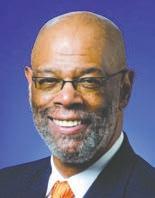
It is at times ironic to me that so many different churches profess the belief that Jesus Christ is the Son of God, was crucified, died and was buried to arise again on the third day and sits at the right hand of His Father in heaven. From Catholic to Pentecostal, from Baptist to Presbyterian, from Episcopalian to Methodist, from Church of God in Christ to Lutheran, from Evangelical to just being saved, each denomination wants to set itself apart from the others based upon its doctrine being more in line with God than any of its Christian cousins. Throughout history so-called Christians have persecuted other so-called Christians in the name of being more in tune with God’s Word than the denomination being persecuted.
It’s just the more I read the Bible the more confusing this becomes, or the more ridiculous. As a point of reference in my own faith walk, one of the things that got in my way was the decision about which church to actually join. I was introduced to
the rural Baptist traditions by my grandmother, only to be baptized Catholic as a young boy and subsequently not follow any particular religion most of my adult life.
Even now I sometimes question which church I should attend only to have the Lord back slap me with the fundamental question, “How does where you go to church have anything to do with my Son’s ministry?” When you actually think about it, do you really believe God is paying attention to the marquee of the church you attend? Do you really believe that where you go to church on Sunday carries more weight with God than what you do on the other six days of the week?
When I get confused on this issue, I’m reminded to pick up a Bible and rekindle the notion that faith is an
internal measurement that refuses to succumb to external pressures.
In this instance the external pressure is manmade and not God sent. For those who believe their religion or theology is better than someone else’s, they surely have missed the entire point of the life and times of one Jesus Christ. My reading of scripture confirms for me, maybe not for you, that Jesus was anti-theology and pro faith.
I mean we are talking about someone who rather angrily turned over tables in the Temple because He was insulted by the goings on there; something to do with not using his Father’s house for prayer, but rather as a den for robbers. Everything Jesus stood for seems to translate into acts of faith, acts of worship, acts of love and kindness and forgiveness
and yes, acts of mercy. These acts don’t confirm for one moment that one person’s religion is better or more meaningful than the religion practiced in the church up the street or around the corner.
If Jesus was alive today, would you be Sadducees of Pharisees?
Would you be Jew or Roman?
Would you be a member of the Sanhedrin? Either way, if you were not carrying out the will of God the Father, you more than likely would have problems with God the Son.
You see the Law, your religion, your theology will be forever secondary to the will of God. Now I didn’t say this. Jesus did.
In closing let me confirm that there is no better place to follow the simple edict, practice what you preach, than in church. Which church is actually quite irrelevant as I see it. “For we are God’s workmanship, created in Christ Jesus to do good works, which God prepared in advance for us to do.” Ephesians 2:10.
May God bless and keep you always.
Recent flooding in Atlanta upended daily life for college students like me. I’m a sophomore at Spelman College, where we had to trek through several inches of water to get to class. At Clark Atlanta University, the flooding displaced two dozen students.
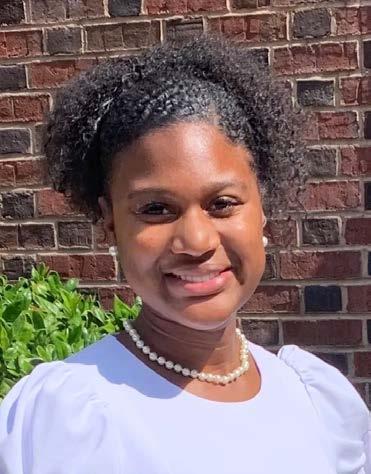
I watched video after video of Clark students who needed to be pulled out of flooded cars. Some of these students ended up losing their cars. Others got injured and had to go to the emergency room.
This is just the latest example of how climate change is manifesting in the form of extreme weather events, jeopardizing all of our health and well-being. If we don’t do more to address it, the climate crisis is going to continue to get worse.
I’m grateful for the Biden-Harris administration’s commitment to clean energy and to tackling topics that are top of mind for young people. Yesterday, I got to attend Vice President Harris’s address at Morehouse as part of the “Fight for Our Freedoms” college tour, which is focused on the climate crisis and other issues I’m passionate about, from gun violence to voting rights to reproductive freedom.
Talk needs to be backed up by action, and so far I’ve been encouraged by the actions that the Biden-Harris administration has taken on climate change and clean energy.
The Inflation Reduction Act signed into law last year is the most consequential climate legislation in American history. It’s already created 170,000 jobs, most of which are in communities of color.
Just last week, the administration announced the creation of the American Climate Corps, which will create jobs for 20,000 young people in fields related to clean energy, conservation, and climate resilience. This is a huge step towards including young
people like me and my classmates who are interested in pursuing work that helps fight climate change but don’t know where to start.
I’m majoring in political science, and climate change rarely comes up in my classes. Students on campus sometimes talk about how they’re worried they can’t find good-paying jobs that will also help curb climate change. The American Climate Corps includes training and service opportunities that fill this niche, helping to mobilize my generation around an issue that’s top of mind for us.
The American Climate Corps is also designed to be inclusive and diverse. For too long, communities of color have been left out of the climate conversation, even as they’re disproportionately affected by extreme weather events. We need to center environmental justice in the transition to clean energy, and diverse training and apprenticeship programs are critical to doing that.
When flooding caused the water system to fail in Jackson, Mississippi, numerous members of my family were forced to live without clean water for months on end. It makes me angry that over a year later, Jackson’s Black residents still don’t have the same access to clean, safe water that so many other Americans take as a given.
News recently came out that 11 out of 52 water systems in Georgia have toxic “forever chemicals” in their drinking water. Once
again, I felt frustrated and upset. We all deserve clean water and air, no matter our race or our zip code.
I’m advocating for more transparency from our state and federal government on the steps they’re taking to secure environmental justice. I appreciate Spelman for taking steps to ensure students’ health and safety by placing filter systems on some of the water fountains on campus, but for me, environmental justice means not having to worry about whether the water on-campus is clean and safe to drink in the first place.
My passion for environmental justice is a big reason why I’m appreciative of the administration’s Justice40 initiative, which directs 40% of federal clean energy benefits to communities overburdened by pollution. Morehouse, Spelman, and Clark Atlanta all fall within tracts of Fulton County that qualify for this program. Our campuses and communities deserve clean water, good-paying jobs, and protection from dangerous floods. Making this a reality will require doing everything we can to ensure that climate doesn’t get put on the backburner.
Initiatives like the American Climate Corps will make it easier for me and my classmates to go into clean energy and conservation jobs and be part of this change. I’m grateful for this investment by the Biden-Harris administration, and excited to be part of a generation that’s building a healthier, safer future for our planet.
My reading of scripture confirms for me, maybe not for you, that Jesus was anti-theology and pro faith.

Read full article online at www.theatlantavoice.com
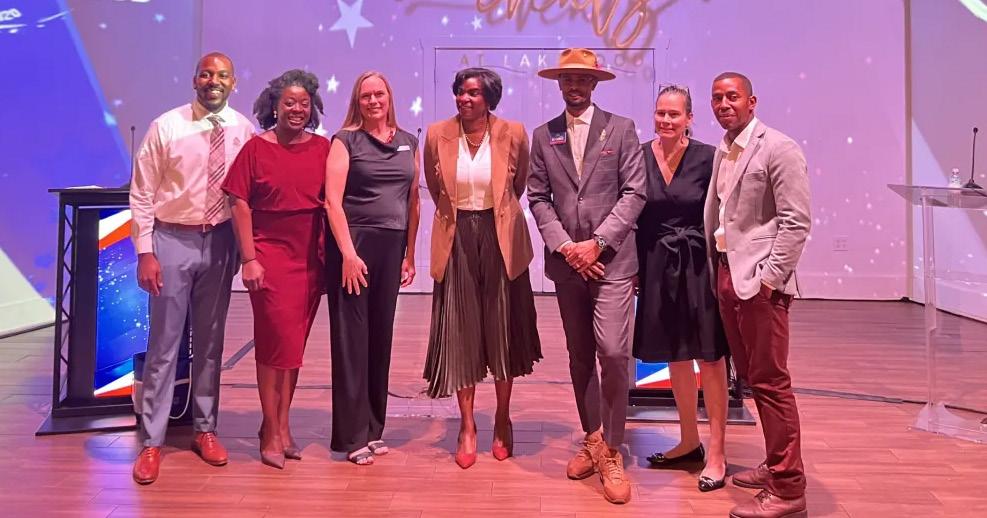 BY ISAIAH SINGLETON
BY ISAIAH SINGLETON
Early voting begins in less than a month for the Atlanta School Board elections with 10 candidates vying for votes and the opportunity to help shape the city’s public school system. The 10 candidates are running for five open school board seats (out of nine) in Atlanta Public School districts 1, 3, and 5, plus at-large citywide districts 7 and 9.
Early voting is scheduled from Oct. 16 through Nov. 3. Election day is Nov. 7 and runoff elections for any seats, if necessary, will take place in December.
The 2023 Atlanta School Board candidates are:
District 1, Maynard Jackson Cluster:
• Incumbent Katie Howard, who is running unopposed, was first elected in 2021. For the last 15 years, Howard has served as a staff member for three city council members giving her a wealth of experience in government and policy making systems, as well as providing meaningful relationships with people and organizations throughout the city.
District 3: Midtown Cluster
• Incumbent Michelle Olympiadis has served on the school board since 2017. She is also a board member for the Georgia School Boards Association.
• Ken Zeff is the executive director of local education nonprofit Learn4Life. He served as Fulton County’s interim school superintendent for the 2015-16 school year.
District 5: Mays Cluster
• Incumbent Erika Mitchell was first elected in 2017. She’s the vice president of business development for ChanceLight Education, which contracts with public school districts and other educational institutions to provide special education programs.
• Raynard Johnson, is a digital media and
IT consultant. He lost bids for an APS board seat in 2017 and 2021.
District 7: At Large
• Incumbent Tamara Jones has worked in architecture and urban planning for over 25 years, according to her campaign bio. She was elected to the board in 2021.
• Alfred “Shivy” Brooks teaches economics, personal finance and government at Charles Drew High School for Clayton County Public Schools. Brooks unsuccessfully ran for Post 1 at Large on the Atlanta City Council in 2021.
• William “Will” Sardin has worked as a registered nurse for 30 years in both the clinical and administrative areas.
District 9: At Large
• Jessica Johnson was appointed to the school board in January 2023 to fill former board member Jason Esteves’ seat. Esteves resigned because he was elected to the Georgia Senate.
• Nkoyo Effiong Lewis is an education advocacy attorney and directs the Law Practice Management program at the State Bar of Georgia.
Atlanta’s airport was recently named the second-best in the country for domestic connectivity.
In a September report from OAG, which compares the number of possible domestic and international flight connections to the number of destinations served by each of the 100 largest airports in the world, Hartsfield-Jackson Atlanta International Airport received the second-highest domestic connectivity index of the 25 American airports ranked, only falling behind O’Hare International Airport in Chicago.
Rounding out the top five airports for domestic connections are Denver International, Dallas/Fort Worth International and Charlotte Douglas International, coming in third, fourth and fifth place, respectively.
Six airports in North America landed on OAG’s Top-20 list for international connectivity, five of which are based in the United States.
Atlanta’s airport ranked 14th for global connectivity, once again bested by O’Hare
International and New York’s John F. Kennedy International, which placed second.
The study also compares this year’s rankings to results from four years ago. Hartsfield-Jackson dropped six places on the international leaderboard since 2019, having previously joined O’Hare in OAG’s list of the Top-10 airports for global connectivity. Contrarily, Hartsfield-Jackson’s ranking for domestic connectivity remained unchanged, along with the other two airports that rounded out the list’s Top 3.
The report also listed each airport’s most dominant carrier, or the airline responsible for each airport’s largest share of departing and arriving flights. Atlanta-based Delta Airlines was cited as the most widely represented airline inside Hartsfield-Jackson, with roughly 75% of scheduled flights belonging to the carrier.
Delta was also listed as the most prominent airline across three additional American airports on OAG’s ranking of the 50 most globally connected megahubs: John F. Kennedy International, Los Angeles International and Boston Logan International.













RICE stateholders
Yaminah Childress and her daughter partners of YANY Beauty will be attending Walmart’s Open Call for entrepreneurs in late October.
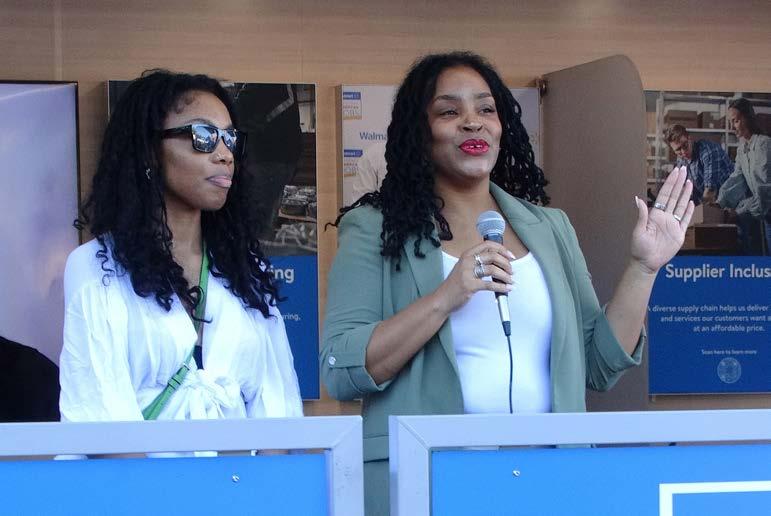
 BY STAN WASHINGTON
BY STAN WASHINGTON
(Atlanta) - The Russell Innovation Center for Entrepreneurs (R.I.C.E.) (Oct. 3) took another major step in becoming “the” place for black and brown entrepreneurship in the country thanks to a major donation by the nation’s largest retailer.
Walmart’s philanthropic organization Walmrt. Org Center For Racial Equity kicked off a new partnership with R.I.C.E with a $800,000 donation. The donation will help launch RICE’s new and innovative PayPal Retail Academy designed to educate entrepreneurs operating in the retail business.
“Entrepreneurs of color face unique and significant barriers,” said Monique Carswell, director, Walmart.org. “According to data from CrunchSpace, black entrepreneurs typically receive less than two percent of all venture capital each year and unfortunately black women receive even less than one percent. However, with programs like the center here and the programs we are doing together defy the odds and accelerate the pace of change for entire communities and generations to come.”
RICE CEO Jay Bailey thanked Walmart for the major donation and its commitment to aiding small black and brown entrepreneurs.
“Thank you for the opportunity for black entrepreneurs to see their value and their own reflection on the shelves where they shop everyday,” Bailey said. “ It really means something. And for us to be a conduit by
which entrepreneurs don’t have to figure it out all by themselves, to be able to put the pieces in place is significant.”
The donation is part of the $100 million over five years Walmart.org has dedicated to address racial disparities in the U.S.
“Through philanthropy we are investing in organizations that are helping black busi-
nesses in the retail industry grow their companies by tackling traditional barriers to success such as access to capital, social capital, marketing, .etc.,” Carswell said.
Walmart has also committed to spending $350 billion on purchasing products that are either made, assembled or grown within the U.S.
Each October, entrepreneurs make the pil-
grimage to northwest Arkansa to pitch their products to get them on Walmart shelves. This year over 800 entrepreneurs have been invited to participate in the retail giant’s Open Call Oct. 24-25, according to Mark Espinoza, senior director, Walmart Public Affairs.
"We believe the next generation of great products that deserve to be on our shelves come from the innovative entrepreneurs and small businesses in our own communities,” Espinoza said. “ Open Call as well as our collaboration with RICE are symbols of Walmart’s deep commitment to fostering supplier diversity, inclusion and strengthening U.S. manufacturing pipelines.”
“We are going to be the place that when you see RICE on the head of any application that comes in Walmart will know that they will have to give it a good look because we are going to prepare these entrepreneurs to win, to be shelf ready, to be retail ready or if it just means they will be a better company because of the investment you are making in us that’s our commitment to you,” Bailey said.
“With the funds from this grant we will be able to assemble what I think will be the most comprehensive academy to help businesses jump over those hurdles that they think they face by themselves,” he added.
Atlanta businesses YANY Beauty and Extended Brush will be among the RICE stakeholder businesses represented at this year’s Open Call.
Not long after starting work as a practicing physician, Dr. Paula Braveman reached an important diagnosis: many of the Black patients she treated for things like hypertension or diabetes had something in common. She later confirmed the observation as a public health researcher in San Francisco. Being Black in America, she concluded, is hazardous to your health.
“Once you are sick, you definitely want medical care, but it is the conditions of your life that largely determine whether you get sick in the first place,” says Braveman, founding director of the Center for Health Equity and professor of family and community medicine at the University of California-San Francisco.
“Structural racism systematically exposes Black people to health-harming conditions and obstructs their progress to health-promoting conditions,” Braveman says. “These factors did not just suddenly emerge. They have always been there, from slavery on.”
There is, however, an interim prescription, Braveman says: Black people connecting to talk about their experiences in an atmosphere designed to heal, not hurt.
“I think that seeking opportunities for Black people to come together and discuss with each

“Structural racism systematically exposes Black people to health-harming conditions and obstructs their progress to health-promoting conditions,” Photo Credit: Ribbet Stock/Liz Courquet-Lesaulnier

other their experiences of racism, and how they deal with it, could have healing effects, but only if sustained over time,” Braveman says. “Racial healing is absolutely part of the equation.”
Until recently, the notion that things as disparate as housing or education can influence a person’s health outcomes was a radical idea with little scientific support. But researchers like Braverman and others found solid evidence that social determinants — the conditions and circumstances in which people are born, grow, live, work, and age — can shape their well-being.
Factors driving health inequity are “dispar-

ities in the conditions that people experience, including racism in its many forms,” such as economic insecurity, unsafe or insecure housing, and poor nutrition, to name a few, Braveman says. “It’s important to understand that for Black people, racism, particularly structural and systemic racism, is actually the cause of almost all the other causes on this list and longer lists.”
Those conditions, she says, confirmed what she’d seen when she was a young doctor.
“So many of my patients needed changes in the circumstances of their lives that could only be accomplished” through broad societal changes and public policy, Braveman says. “I see it all the time in my and others’ research findings.”
For example, a study Braveman did with colleagues, she says, found that “among Black women, those who often or very often worried about being treated unfairly because of their race, were far more likely to give birth prematurely than Black women who were comparable in many other ways but who did not often worry about being treated unfairly because of their race.”
While it wasn’t until the last decade that social determinants of health became a field of study, “a light is at last being shone on them, with an understanding that they are direct products of racism,” Braveman says. “They operate whether or not any particular individual is identified who intends to discriminate; they operate because they are built into structures and systems, e.g., policies, laws, entrenched practices.”
For solutions, however, Braveman believes there must be racial healing on a broad scale.
“I think that seeking opportunities for Black people to come together and discuss with each other their experiences of racism (and how they deal with it) could have healing effects, but only if sustained over time,” she says. “At least in the beginning, a skilled facilitator is probably needed, so this is not a super-cheap intervention.”
Braveman also points to the California Department of Public Health’s Black Infant Health Program, a series of classes specifically designed to address racial trauma among pregnant and parenting Black women.
Along with providing long-term planning and a support network of other Black birthing people, the BIH program addresses internalized racism “by including a discussion of a ‘Black icon’—a Black individual who has made significant contributions to society,” according to a program description.
While support for new parents and racial healing can help, reversing social determinants of health and creating health equity has to happen at a higher level, Braveman says.
“The primary focus needs to be on changing the laws and policies (e.g. on voter suppression; on funding for schools; on environmental injustice) that are the fundamental instruments for racism’s effects,” she says.
This story was produced in partnership with the W.K. Kellogg Foundation.

Black folks need facilitated spaces specifically designed for coming together to foster “racial healing on a broad scale.”

When Wellstar Health System’s Atlanta Medical Center closed its doors in 2022 after serving the community for more than 100 years, local residents worried that the loss would most deeply impact Black and low-income communities.

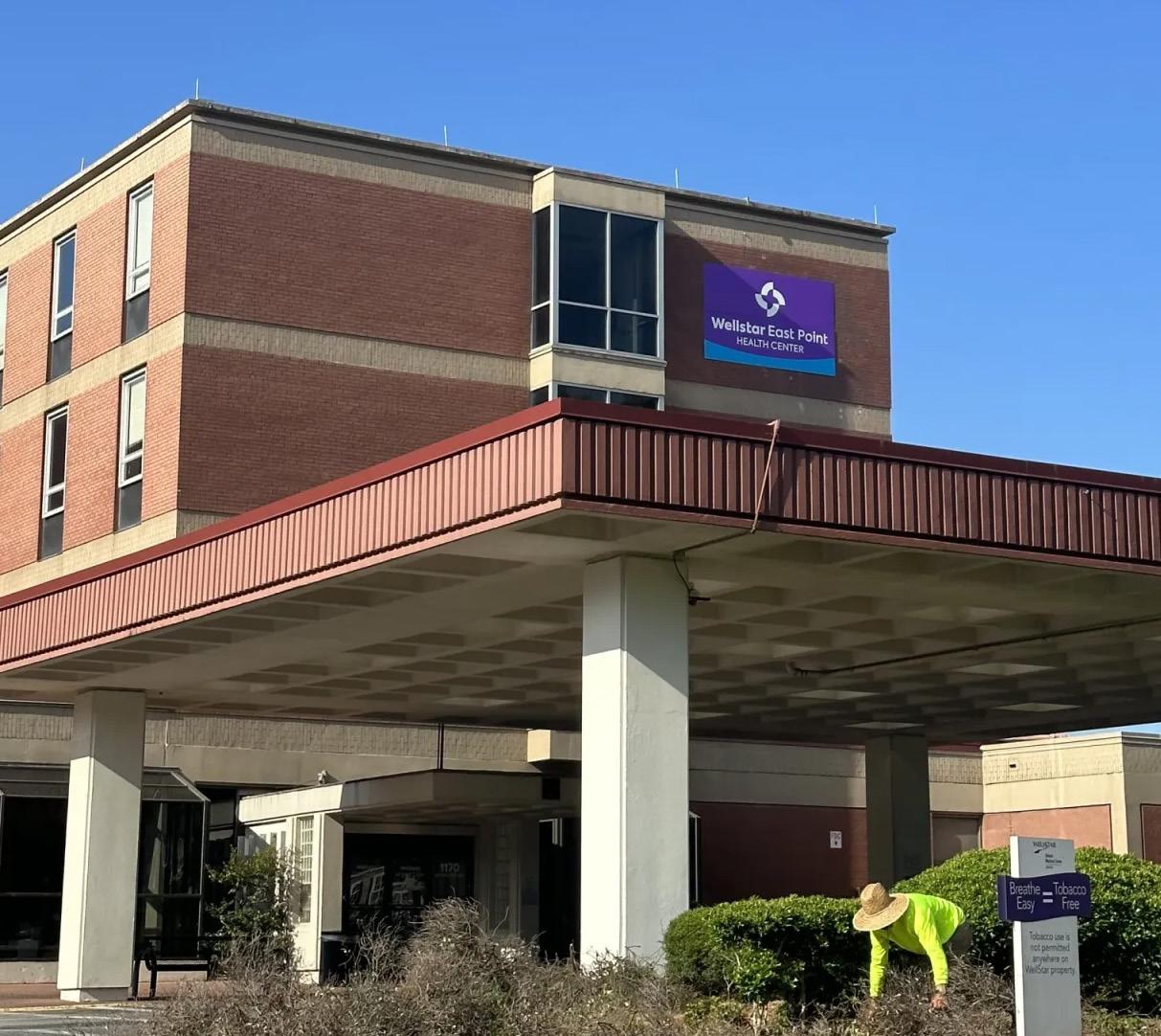
They were right.
With the closure of Atlanta Medical Center (AMC), there’s now only one level 1 trauma center in the region. Wellstar reportedly closed both AMC in Atlanta and Atlanta Medical Center South in East Point due to a decline in revenue. As a result, several doctors’ offices in Atlanta and the south metro area either closed or relocated. In March of this year, a group of Atlanta lawmakers accused Wellstar of discriminating against communities of color, and called for a Federal investigation, Fulton County Commission Chairman Robb Pitts told local media. Community advocates and health policy experts say that the closure exemplifies systemic inequality and point to Atlanta as just one city in what is becoming a national trend of hospitals closing in urban areas. Over the past several years, hospitals in Chicago, Philadelphia and Washington, DC, shuttered, leaving poor and predominantly Black communities without local hospitals, they say.
When AMC closed, Wellstar ran an opinion piece in The Atlanta Journal-Constitution that laid out the steps they took to find potential partners that could have helped keep AMC open.
“While the decision may have felt abrupt, it came after an exhaustive search,” Candice Saunders, president and CEO, and O. Scott Swayze, MD, chair of the board, wrote. “However, after learning more about AMC’s infrastructure and finances, none were willing to move forward. Discussions with state, local and community officials also offered no alternate paths forward.”
And, at a recent meeting of the Georgia Senate Health and Human Services Committee, Wellstar officials told the committee the decision to close AMC was unavoidable, as reported by Capitol Beat. Jim Budzinski, Wellstar’s chief financial officer, told the committee that AMC’s financial situation went from a 5.2% operating margin in fiscal 2019, the year before the pandemic, to a $109 million operating loss during the last fiscal year. He also estimated that it would cost an additional $650 million to replace the hospital.
Saunders reportedly told the committee that Wellstar had asked state and local elected officials for help but got none. The state allocated $130 million in federal pandemic relief funds to Grady Memorial Hospital to help offset the closing of Atlanta Medical Center, but nothing for AMC itself.
“We did our best,” Saunders told the committee. “We exhausted all options we were aware of.”
The closing of AMC has had an outsized impact on the Black community in Atlanta, the complaint to Federal authorities alleges. Atlanta is nearly 50% Black, according to the United States Census Bureau. According to figures provided to the Atlanta Journal-Constitution by Wellstar, of the nearly 4,300 emergency room patients the two AMC locations saw in 2019, 67.3% were Black and more than half were Medicaid and Medicare recipients.
The issue goes beyond the numbers to those who have grown to depend on the nearby hospital.
The baby was born in a hurry. His mother, Nathalie, was rushed to a local hospital due to pain she had been suffering midway through her pregnancy. Once there, doctors told her the umbilical cord was wrapped around the baby’s neck. He had to be delivered via an emergency Cesarean section.
Braelin Peace Meekkill King-Miller was born on July 4, 2022, at AMC before its closure. Research shows that local hospitals provide services that go far beyond emergencies like the one Nathalie faced with baby Braelin.
Nathalie’s mother, Ana Carril-Grumberg, could not believe the hospital that saved the lives of her daughter and grandson was ever in danger of closing in the first place.
“How can this happen,” she asked rhetorically. “How can they close a hospital that does so much good?”
Continued from page 10
The community spoke up in opposition
Atlanta Medical Center officially closed at the stroke of midnight on Nov. 1, 2022. In the aftermath, dozens of supporters rallied outside of the 100-plus-year-old hospital as Georgia Department of Transportation workers methodically removed hospital signs.
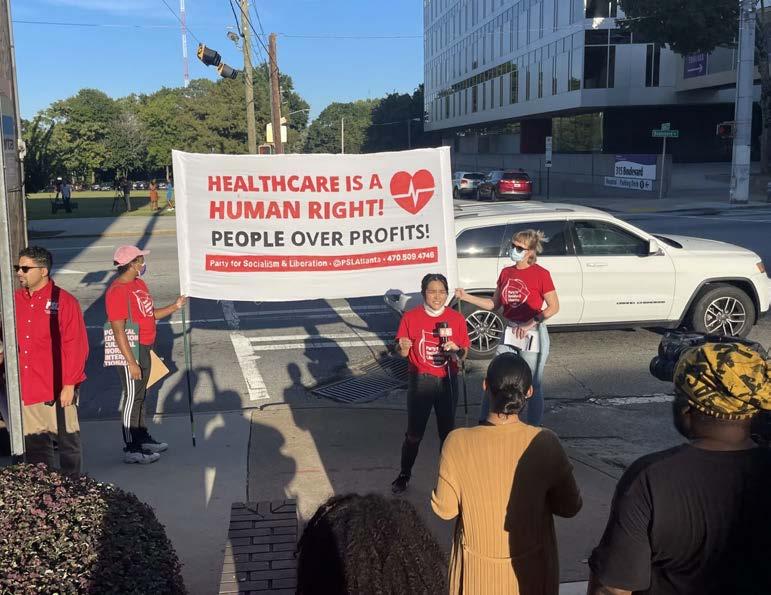
There was much unrest in the local community surrounding Wellstar Health System’s announcement that the company would close AMC in order to stem financial losses. Despite public protests, Wellstar shut the hospital serving hundreds of local residents per day and employing hundreds of medical professionals and hospital workers.
Not having access to a hospital is a major health inequity
According to research by Deloitte’s actuarial team, health inequities account for approximately $320 billion in annual health care spending, signaling an unsustainable crisis for the industry. If unaddressed, this figure could grow to $1 trillion (US) or more by 2040.
A large part of prevention can be proximity. For example, Grady Memorial Hospital is located at 80 Jesse Hill Jr. Drive SE, which is only two miles from where AMC was once located. That distance, however, can take someone in need of immediate medical attention approximately eight minutes by car
or more than 20 minutes walking. In Atlanta rush hour, that distance can be the difference between life and death.
“If women like me don’t speak up then nothing will happen,” Carril-Grumberg, who is white, says. Nathalie is half-Black and Carril-Grumberg knows the maternal mortality
rate for Black women, in particular, is stark
According to the Centers for Disease Control and Prevention, Black women are three times more likely to die from a pregnancy-related cause than white women. A study by KFF, which found similar disparities, cites broad social and economic factors, structur-
al and systemic racism, and discrimination as major contributors to the problem.
The doctors at AMC did not treat her daughter like a statistic, Carril-Grumberg said. Having access to a major hospital has likely meant that many lives have been saved during the decades AMC had been operational.
“They don’t give that (same) opportunity to a lot of young women, in particular Black women, and that’s why there is such a high birth mortality rate,” Carril-Grumberg says.
As she prepared to feed Braelin a bottle of his mother’s breast milk, Carril-Grumberg asked again, “How can this happen, how can this hospital be closed?”
The money that Wellstar could make by selling the massive 25-acre property to a developer is on hold for the moment. In September 2022, Atlanta Mayor Andre Dickens issued a temporary moratorium on any development of the property, leaving the community in limbo.
In the meantime, Grady Hospital,the city’s only level 1 trauma center, is left to absorb many of the patients that would have gone to AMC. In fact, emergency room visits and trauma cases have more than doubled at hospitals across Atlanta, according to leaders of those hospitals.
This article, inspired by Deloitte research, is part of a series in which five Black-owned publications around the United States explore how health inequities impact racial and ethnic minority groups.

GEORGIAACCESS.GOV
is
Shop
Stop

Read full article online at www.theatlantavoice.com
Many families across the state do not have access to nutritious food in their community or if they do, they are unable to afford it. Without the means to purchase healthy foods, food bank recipients face tough choices about where to spend their money and what foods they eat.
The Atlanta Community Food Bank hosted a Lunch and Learn webinar event in honor of Hunger Action Month where attendees learned about the meaning of the Georgia Farm Bill Reauthorization, the importance of Farm Bill nutrition programs, and how to take action/advocate to improve policies for more food-secure communities.
What is the Farm Bill & its importance?
The Farm Bill is the major federal food and farm legislation that includes a wide range of agricultural and nutrition policies.
According to Kyle Waide, CEO, and president of the Atlanta Community Food Bank (ACFB), the Farm Bill is an important instrument for providing support to families who are facing food insecurity.
The bill was first created during the Great Depression and Dust Bowl of the 1930s to address the farm economy. Congress seeks to reauthorize the Farm Bill every five years and they began the process of committee hearings and listening sessions in 2022 for the 2023 Farm Bill.
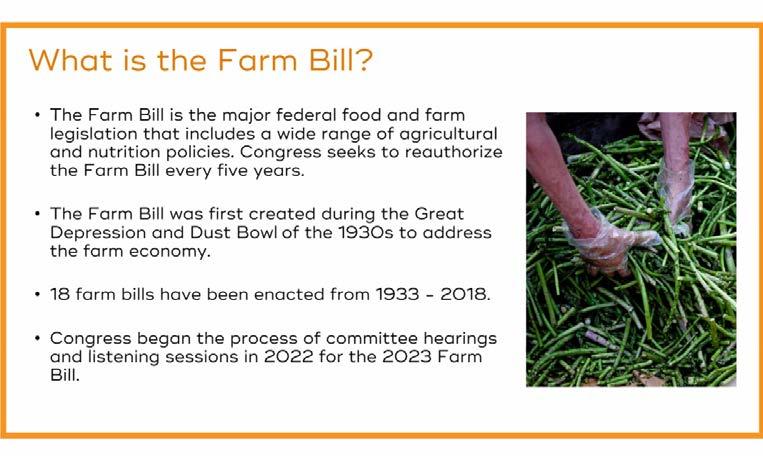
According to the ACFB, in 2021, 33.8 million people in the United States suffer from food insecurity. Of that number, 9.2 million are children. In Georgia, for 2021, 1.1 million struggle with food insecurity, and of that number, 335,720 children are affected.
Waide said it’s an important time in the Atlanta community and communities across the country to discuss the Farm Bill and the impact it can have in supporting more families.
“In our food bank, we have seen a dramatic increase in the number of people who are seeking assistance from us over the last 18 months,” he said. “We’ve seen the population of people seeking help through our network grow by more than 40 percent, which is an astonishing increase and that’s entirely related to the economic challenges that are facing so many of our neighbors across the community like inflation.”
Farm Bill Policy Goals: SNAP, TEFAP, & CSFP
Out of the $428 billion funding for the Farm Bill, nutrition makes up $325.8 billion
(78%) of the overall budget.
The Farm Bill impacts access to nutritious food for millions of American families struggling with hunger. Nutrition provisions include the Supplemental Nutrition Assistance Program (SNAP), The Emergency Food Assistance Program (TEFAP), and the Commodity Supplemental Food Program (CSFP).
SNAP provides nine meals for every meal provided through food banks in Georgia. In June SNAP assisted over 693,000 Georgia families by providing over $256 million in food purchasing assistance. From October 2021 to November 2022, nearly 72% of SNAP participants were in families with children and nearly 32% were families with older adults or a family member with disabilities, according to Waide.
Additionally, all eight food banks serving Georgia receive food through TEFAP and it accounted for 8% of the Atlanta Community Food Bank's distribution in 2023, down from 34% in 2021, according to ACFB.
Waide said these priorities are intended to protect and strengthen the federal nutrition programs by centering equity and the participant experience for neighbors. Their goal is to increase access, funding, and eligibility for nutrition programs to meet the nutritional needs of their neighbors and the communities they serve.
The ACFB three policy goals are:
1. Strengthen TEFAP Funding:
• $500 million for baseline TEFAP food purchases, adjusted for inflation by the Thrifty Food Plan; this would double the annual baseline funding from current levels
• Reauthorize and increase to $200 million discretionary funding for TEFAP Storage & Distribution grants
• Reauthorize $15 million in discretionary
funding for TEFAP Infrastructure Grants
• Increase Funding and Streamline State Participation in the TEFAP Farm to Food Bank Program
• Increase partnerships with growers and producers
2. Strengthen and Protect SNAP:
• Strengthen SNAP benefits by protecting the TFP increase
• Simplify and streamline eligibility and enrollment processes
• Strengthen efforts to support work
• Ensure parity in food assistance for U.S. Territories and Sovereignty for Native communities
3. Reauthorize and Streamline Reporting for CSFP 2023 Farm Bill Timeline
According to Waide and Middleton, the House and Senate Agriculture committees began holding Farm Bill congressional hearings and field hearings in 2022 and early 2023 to hear from advocates on how to improve nutrition programs in the Farm Bill.
Several members of Congress have already introduced "marker" bills around policy priorities they want to address in the Farm Bill. A marker bill is a policy proposal that is introduced as individual legislation and can be used as a starting point to debate inclusion of it in bigger legislation like the farm bill.
So far, committees have begun drafting their versions of the Farm Bill, in which the House and Senate Agriculture Committees will each release their versions this fall. The current Farm Bill expires Sept. 30, and it’s expected Congress will pass a Continuing Resolution (CR) to allow the programs to continue during this process. The last several farm
bills have not been passed on time.
Additionally, Waide said there’s a lot of discussion going around regarding the approach of a potential government shutdown within the next few days, which could have an impact on the new farm bill getting authorized.
“We are expecting this farm bill process to take a while to reach its conclusion due to the talks of a potential government shutdown and until Congress resolves that debate, it’s hard for the bill to get completed until it’s resolved,” he said. “It’s possible that a new Farm Bill won't get authorized as far away as December 2024, so this could be quite a marathon and we’re going to need everyone’s engagement to let Congress know how much demand and need is in our community right now and how important SNAP and all the other policies/programs are.”
A government shutdown would disrupt the U.S. economy and the lives of millions of Americans who work for the government or rely on federal services from the military personnel and air traffic controllers who would be asked to work without pay to some seven million people in the Women, Infants and Children program, including half the babies born in the U.S., who could lose access to nutritional benefits.
The Atlanta Community Food Bank gave attendees tips on what they can do to help:
1. Contact your member of Congress and Senators Warnock and Ossoff
• Call their district or DC office and tell them you support our priorities.
• Follow on social media and post Farm Bill priorities
• Learn about your member of Congress, you may find a personal connection: you possibly attended the same high school or college/university; religious organization; other activity.
2. Encourage others to advocate for food secure communities.
• Family, friends, and co-workers
• Board members, business leaders, faith leaders, Local elected officials, healthcare providers, local businesses, local farmers
• Call/email them about the Farm Bill and our priorities
• Encourage them to contact their MOC/ Senators about our Farm Bill priorities. For more information, visit https://www.acfb.org.



 BY NOAH WASHINGTON
BY NOAH WASHINGTON
Are You Ready To Take Your Career to New Heights in The Digital Era? This is the mantra that the YWCA holds as they aim to make strides in bridging the digital divide to empower women with the essential skills they need to succeed in today's tech-driven world.
The Digital Skills Academy is a class that offers its participants the opportunity to bridge this gap. In a study done by McKinsey Group, Black Americans constitute about 13% of the overall workforce but represent only 7.4% of digital workers, leading to disparities in income and wealth.
Program manager Sooraya Williams is a dedicated advocate and the driving force behind the Digital Skills Academy.
Williams was born in Macon. Her parents, her mother is from Sri Lanka, met during their time at Georgia College. Williams was raised in a family with four other children with limited access to technology. She didn't have her own laptop until her junior year of college. This experience forged a deep connection to the need for accessibility and affordability of technology and understanding the importance of having the right tools to succeed in today's digital age.
“We are building this program to reflect what is needed. Right now, I believe 94% of every job
needs basic digital skills. And that area is where 60% of those households are all led by women,” Williams told The Atlanta Voice.
After earning a degree in political science from Georgia State University, Williams went to work for YWCA in 2019. She knows that the programs that YWCA have are more than just digital literacy programs.
The YWCA's approach is deeply rooted in strategic inclusivity and active listening, as Williams remarks. Aiming to prioritize women and community needs within their program, recognizing that many organizations often fail to listen, relying on assumptions instead. This commitment to collaboration allows the program to adapt and evolve based on what the women truly want and need, extending beyond the realm of digital skills and career readiness.
“A lot of the time we're not listening, a lot of organizations, and just people in general don't necessarily listen to the women and the people in the community,” Williams said.
The program is aimed at all ages but primarily consists of women above the age of 50. This includes Leslye M. Booker, 60, a hairdresser and owner of Paper Doll salon from Center Hill, who is seeking to take her business to the next level.
“I had a client that I was expressing that I hadn’t reached my full capacity in my business
because there was so much about technology that had become so vast and foreign that I didn’t know what I was doing,” Booker told The Atlanta Voice.
The YWCA program offers a range of support beyond basic digital literacy. Participants receive laptops, hotspots, professionally written resumes, and even professional headshots, all for free. The curriculum is tailored to the needs and desires of the women in the program.
“Just having a computer that someone gave me makes me feel very fortunate and glad to be a part of the program that has so many different types of people,” Booker said.
The program extends beyond digital skills. It teaches women how to advocate for better living conditions, better opportunities, and a brighter future for themselves and their children.
As previously stated, the class accepts all young or old. 27-year-old Kennesaw State University student Miranda Wilkinson.
“I just had a baby and it covers a lot from personal development to career development and those are all the things that I am looking to get better at,” Wilkinson told The Atlanta Voice.

After facing disappointing news in the job search, Wilkinson, a fresh entrepreneur, wanted to take the initiative towards her own future. Now the owner of Meditationize, her own busi-
ness dedicated to personal wellness through meditation, Wilkinson is striving to elevate her business to the next stage with her first corporate event happening later this month.
“This class covers financial planning and budgeting. I am launching my business, and this helps entrepreneurs figure out retirement and what you can do outside of 401k’s and IRA’s,” Wilkinson added.

With 50 women currently enrolled and 20 more on the waitlist, Williams and her team are expanding their efforts. They're working on creating a cycle of two sessions in the fall and two in the spring, with shorter classes during the summer to maintain connections with alumni.
“I’m extremely humbled and I know what it is like to need help. So to be in this city where I can be an avid listener and a solution to a lot of problems means a lot to me,” said Digital Skills Academy instructor Cam Miller to The Atlanta Voice.
Classes are offered on Saturdays from 10 a.m. to 2 p.m. and on weekdays every Tuesday and Thursday from 6:30 - 8:30 P.M with classes being remote via Zoom to accommodate the schedules of the women they serve.
To learn more information visit: https://ywcaatlanta.org/digitalskillsacademy/.
-year veteran shooting guard and defensive presence Wesley Matthews held his daughter's hand while cradling a tote bag with The Lovett School logo on it. When Matthews, a new addition to the Atlanta Hawks roster, and his daughter made their way to the station where he was going to be photographed by team photographers he put the bag down and she quickly reached inside for a toy.
The veteran sharpshooter played the past two seasons in Milwaukee and shot over 30% from three. His particular skills from long range and as an on-ball defender are two reasons why Atlanta signed him, according to Hawks second-year head coach Quin Synder.
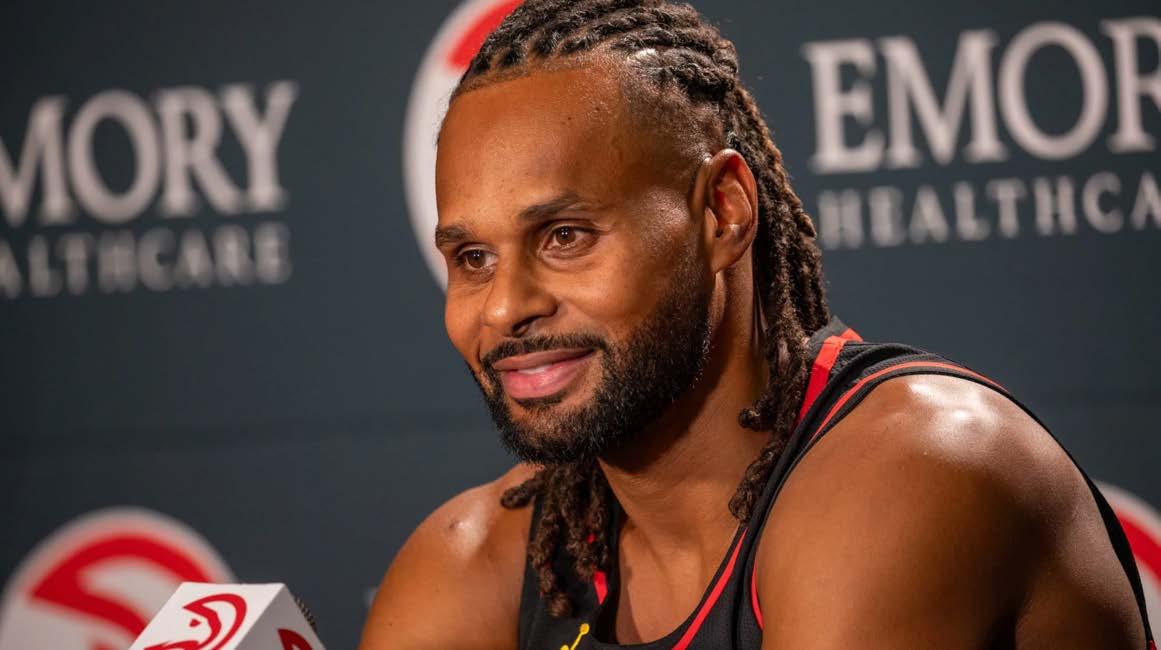
Synder spoke about many topics pertaining to the upcoming season during the franchise's annual media day this morning. One of the topics of discussion was adding Matthews, 36, and former San Antonio Spurs and Brooklyn Nets guard Patty Mills, 35, to the team. Both have played in the NBA for 14 seasons.
During media day Mills shook hands with Hawks staff and longtime Hawks television play-by-play announcer Both Rathbun before getting his picture taken with former San Antonio Spurs teammate Dejounte Murray.
Snyder spoke of the selfless style of play he wants to see this season and how both Matthews and Mills already play that way.
"That's how they've played and demonstrated throughout their careers, both of them, these are pros pros," said Snyder. "Veteran leadership can really be impactful, particularly when that leadership is grounded in that type of experience."
Mills shot 36.6% from three last season as a member of the Nets, but only played in 40
games. Matthews played in a few more games for the Bucks, 50, but both will be coming off the bench to back up starting guards Trae Young and Dejounte Murray. Matthews and Mills' contributions will be more as veteran leaders than scorers, for example.
"They have both been on teams that have won, they know what a winning team looks like, they know what a connected team looks like," said Snyder. "Those are things both Patty and Wes want to share."
Coming into his first training camp and preseason as head coach, Snyder will be counting on veterans like Matthews, Mills
JONESBORO, Ga. — I didn’t get to go to the game in London today, but I’ve still got something to say about the Atlanta Falcons offense: Mix it up a bit won’t you!
Atlanta opened the game with the same three plays or more specifically, for the same player, rookie running back Bijan Robinson, than they did the last time they were home. The only difference is the jig is up. Everyone knows how good and explosive of a player Robinson is. My pick for National Football


League Offensive Rookie of the Year, Robinson has become not only a deadly runner, but the Falcons most sure-handed receiver. It’s time to get some other Falcons involved in a bigger way.
Cordarelle Patterson was back for his first game of the season and needed to get some more touches. Former top-10 draft picks Kyle Pitts and Drake London had a combined 198 receiving yards coming into the fourth game of the season. Robinson leads the team in receiving yards (102). Pitts and London had
and Hawks regulars like Young, Murray, De'Andre Hunter, Bogdan Bogdoanovic and centers Clint Capela and projected starting center Onyeka Okongwu. On what Matthews and Mills will be contributing off the bench Snyder said, "Those two guys have different styles, but with the qualities that they bring they will figure out how to be impactful in those ways."
The loss of veteran forward John Collins, who was traded to the Utah Jazz during the offseason, leaves the team with one less locker room voice, but Snyder believes there are two potential locker room voices in Mills and
Matthews, but in their own specific ways.
"It's not like I'm expecting Wes and Patty to stand up and say 'Hey, here's how it's going to be guys,' but they understand what we're trying to accomplish. They are not the only ones, but they are the ones that have lived it the most."
"I'm excited to have both those guys in our program," added Snyder.
The National Basketball Association held league-wide media days and the Hawks media day took place in a warehouse space on the upper west side where General Manager Landry Fields and Synder talked to the media before the players.
17 combined receptions, Robinson had 14 coming into the game. He caught three more before the end of the first quarter in London. Enough already.
In comparison, Jacksonville Jaguars quarterback Trevor Lawrence threw balls to four different players, including former Falcons receiver Calvin Ridley, who caught a deep touchdown pass from Lawrence to put the Jaguars ahead early.
Ridder took a couple shots at London (in London, LOL) during the opening drive of the second quarter, one was deep down field. Tight end Jonnu Smith caught his 1oth ball of the season during that same drive. There are offensive options not named Bijan Rob -
inson on this team. It’s far beyond time to get them in the game.
A pass attempt to London was intercepted by Darius Williams and returned for a Jacksonville touchdown that put Atlanta down 17-0. The very next offensive play, a play for Pitts, was also picked off. Those plays feel like the end of any chances of offensive variety for the Falcons.
Granted, Robinson made a ridiculous one-handed catch on third down, so I get going to him over and over again. Dude is a Pro Bowl level talent. Falcons offensive coordinator Dave Ragone has got to protect both second-year quarterback Desmond Ridder and Robinson by mixing it up more.

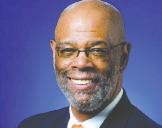
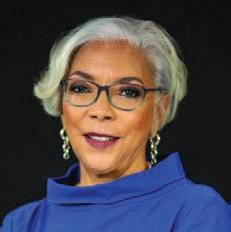
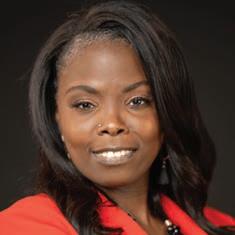
Read full article online at www.theatlantavoice.com

 BY JANELLE WARD
BY JANELLE WARD
Towering between the Georgia World Congress Center and Mercedes-Benz Stadium, construction is nearing completion at the Signia by Hilton Atlanta hotel in downtown, now the tallest building on Atlanta’s westside and the city’s largest ground-up hotel project in four decades.

Once finished, the 42-floor, 976-room destination will offer state-of-the-art amenities and experiences to guests in town for business, sporting events, and other sources of entertainment.
Owned by the Georgia World Congress Center Authority, the hotel will offer easy access to the 1.5 million-square-foot convention center, connecting to the facility from the inside on two separate floors. Signia by Hilton Atlanta is also located steps away from prominent Atlanta landmarks like Centennial Olympic Park and State Farm Arena and will offer guests views of the Atlanta skyline, Mercedes-Benz Stadium and the city’s histor-
ic Vine City neighborhood from their rooms.
Evita McDaniels, director of marketing for Signia by Hilton Atlanta, said that intentionality was a key concept in the developers’ vision for the hotel, as displayed through the hotel’s open layout and seamless flow.
The first five floors of the hotel will feature amenities all visitors will be able to take advantage of, including high-end restaurants, spa facilities, a pool terrace, fitness center, and Club Signia, an exclusive lounge offered as part of a privileges program reserved for top-paying guests. Signia by Hilton is also expected to feature the largest hotel ballroom in the entire state, measuring approximately 40,000 square feet.
Gary Holness, director of property operations for Signia by Hilton Atlanta, said accessibility is another important factor shaping the hotel’s design. Resources like food and beverage stations will be placed throughout Signia by Hilton Atlanta to best serve visitors using the hotel’s conference rooms, ballrooms and other public spaces.
Kenny Monteith, senior marketing manager at Signia by Hilton, said the hotel will accommodate guests paying for stays as well as those searching for a place to spend time before or after events at nearby venues. Signia by Hilton will feature its own separate sports bar on its fourth floor, which will offer 27 local, statewide and nationally renowned brands of beer on tap, as well as sophisticated takes on classic bar foods and Atlanta eats.
McDaniels also said that the hotel will offer modern and sophisticated design elements to guests while paying homage to Atlanta and the state of Georgia’s rich cultural history, naming specific rooms and spaces after influential public figures connected to the area, including former President Jimmy Carter and famed civil rights leader Martin Luther King, Jr.
Signia by Hilton is expected to open its doors at the beginning of next year, currently accepting reservations for large groups starting on January 12. The hotel will open to the rest of the public on February 2.
Signify North America Corp. is seeking an IT Technical Eng (Peachtree City, GA) to spprt & enhnc Flash & othr imprtnt sftwr apps. Reqs a Bach deg in Comp Sci or rltd fld & 10 yrs of exp in IT ops, systms/sftwr dvlpmnt, database archtctr, & infrstrctr. Mst have the fllwng exp: utlzng advncd database concpts, incl stored prcdrs, scrty, prfrmnc stndrds, bckp, & rcvry; systms anlyss, dsgn, & dvlpmnt; prgrmmng langs incl C#, .NET Core, PL/SQL, Angular JS, WEB API, WCF Srvcs, Dart, & Flutter; anlyzng & debggng cmplx sftwr prgrms; SSAS; relational database modlng & dsgn; & wndws & Linux srvrs. Email resume to: taamericas@signify.com & ref job title & job code 25-GA.

